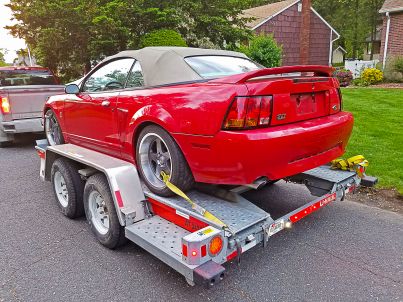Vehicles vary in how they use fuel to power the engines. Trucks, which are heavy, are able to consume more fuel than small cars to travel the same distance. There may be several other reasons, but the most evident one is that large trucks have very sturdy frames.
Connect with a verified mechanic in minutes. No appointments. No high fees. No waiting. Get back on the road and enjoy the ride.
Having good gas miles is important when you need to hire a moving truck, since gasoline costs you between $3.8 and $4 a gallon. When you are planning to move, take into account how much it will cost to fill up a 15-foot truck with fuel and how much it will cost you to move the items you will be bringing with you.
By taking all the factors into account, you can get an idea of how much you are going to spend on your move. In the article, you will find out the mileage that you can expect from your 15-foot U-Haul truck, including the amount of money it will take you to fully charge it.
What Is Gas Mileage?
It shows you how many miles, if you have one gallon of gas, a car can travel. It’s important and economically advantageous for movers to have vehicles that have good fuel economy.
This is good for moving trucks, because they only need to use a little gas to be able to cover a long distance per gallon. Gas mileage is expressed as miles per gallon (MPG), which is the equivalent of miles traveled on a gallon of gas.
It costs less to run your moving truck if you get 11 miles per gallon of gas.Vehicles that get more gas mileage in the city than on the highway do not get as much mileage as those that drive along the interstate highway.
Connect with a verified mechanic in minutes. No appointments. No high fees. No waiting. Get back on the road and enjoy the ride.
It is easy to understand why: when you are traveling through a busy city, you drive slower and you idle at lower speeds, but at higher rpm (revolutions per minute).
15-Foot U-Haul Gas Mileage
The fuel tank capacity that the U-Haul 15-ft truck can carry is 40 gallons each. This means that it can get an estimated 10 miles per gallon. A tank full of gas will take you about 400 miles.

Review engine, brake issues, error codes and more with a Mechanic Online in just minutes.
Ask a Mechanic Live NowHow to Calculate GM (Gas Mileage)?
Many modern-day vehicles are equipped with digital displays that show real-time mileage numbers. It’s really advanced and useful. However, many vehicles, including large trucks, do not have these screens.
For the majority of these trucks, you’ll have to fill up the tank and then figure out how much gas you need to drive the truck. Using a 15-foot U-Haul moving van, here is a step-by- step guide on how to get the most out of your fuel.
- First, top up your truck with 40 gallons of fuel.
- Drive a heavy-duty truck for a 100-mile journey.
- At completion of each 100-mile drive, change the amount of fuel that you use.
- It will cost you 10 dollars to refill 10 gallons of diesel fuel.
- Now, take 100 trips and add up the fuel that you used to drive those miles. The electric motor should get around 10 MPG.
The importance of GM for the Renters
If you are planning to rent an able-bodied van (or truck) from U-Hawk, you must know how much it will cost you to gas it.
And because MPG or miles per gallon is commonly used to measure how efficient your car is, you can prepare yourself for what you can expect to pay for it. It allows people to be more careful
Factors Determining How Well A Truck Gets Gas Mileage
Gas mileage is often expressed in miles per gallon (MPG). It is a method of determining how fuel efficient or economical your truck is. These are some of the major factors which can affect the gas mileage of a truck:
Type of Vehicle
Motor vehicles that have small engines often get a lot more mileage than those that have a big engine, simply because they are heavier. Basically, smaller motors make lighter vehicles and use less fuel. Sometimes a U-Haul trailer can have a better GM than a Toyota RAV4.
Type of Fuel
The kind of fuel your car uses can affect how it performs at engine speeds and thus affect its gas mileage.
The Rating of Fuel Octane
The octant of fuel determines how quickly or how slowly a car burns gas, based on the ratio of fuel to air. If you use fuel that has octane ratings that are high, your engine will work more effectively, which is good for your gas consumption.
The Conditions of Driving
You will get more gas mileage if you drive on a city street compared to driving on a highway. It can be up to 3-5 miles of difference.
Style of Driving
Drivers who drive too quickly will get a lot more gas than those who drive more cautiously and slower. Your car burns a lot more gas when you drive away from a parked vehicle than when you drive carefully.
What type of Fuel Is Used in a 15-Foot U-Haul Truck?
All the fuel that a 15-foot U-Haul truck can hold is 40 gallons. If a motor vehicle must perform at its maximum, it is necessary to fill the fuel tank to the correct level.
How Much Money Needed to Fuel Up 15 Ft. Truck for 1300 Miles?
Firstly, you need to know how much gas you will need to drive 1,300-miles in a moving truck. Using the formula that we used in our previous article, it will take 40 gallons of fuel to drive a 15-foot U-Haul for 400 miles.
It is estimated that you will need 130 GDP of fuel to travel 1,300 miles. To find out how much it will cost you, just multiply the fuel needed (130 gallons) by the price of a gallon of gas ($3.85). You should pay $500.5 for driving a 15-ft. U-Haul truck for 1,300 miles.
Conclusion
The above information is everything that you’ll need if you want to get good mileage from a 15-foot U-Haul truck.
Max Anthony
Max is a gizmo-savvy guy, who has a tendency to get pulled into the nitty gritty details of technology and cars. He attended UT Austin, where he studied Information Science. He’s married and has three kids, one dog and a GMC truck and a Porsche 911. With a large family, he still finds time to share tips and tricks on cars, trucks and more.
Review engine, brake issues, error codes and more with a Mechanic Online in just minutes.
Ask a Mechanic Live Now





